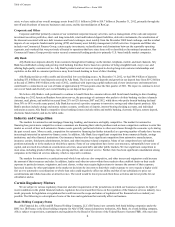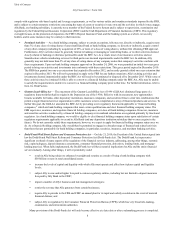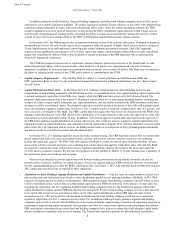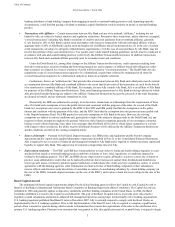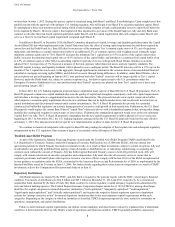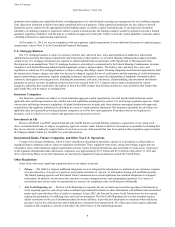Ally Bank 2012 Annual Report Download - page 16
Download and view the complete annual report
Please find page 16 of the 2012 Ally Bank annual report below. You can navigate through the pages in the report by either clicking on the pages listed below, or by using the keyword search tool below to find specific information within the annual report.14
Future consumer legislation could harm our competitive position.
In addition to the enactment of the Dodd-Frank Act, various legislative bodies have also recently been considering altering the existing
framework governing creditors’ rights, including legislation that would result in or allow loan modifications of various sorts. Such legislation
may change banking statutes and the operating environment in substantial and unpredictable ways. If enacted, such legislation could increase
or decrease the cost of doing business; limit or expand permissible activities; or affect the competitive balance among banks, savings
associations, credit unions, and other financial institutions. We cannot predict whether new legislation will be enacted, and if enacted, the
effect that it or any regulations would have on our activities, financial condition, or results of operations.
Ally and its subsidiaries are involved in investigations, and proceedings by government and self-regulatory agencies, which may lead to
material adverse consequences.
Ally and its subsidiaries, including Ally Bank, are and may become involved from time to time in reviews, investigations, and
proceedings (both formal and informal), and information-gathering requests, by government and self-regulatory agencies, including the FRB,
FDIC, Utah DFI, CFPB, SEC, and the Federal Trade Commission regarding their respective operations. Such requests include subpoenas
from each of the SEC and the U.S. Department of Justice. We continue to respond to subpoenas and document requests from the SEC, seeking
information covering a wide range of mortgage-related matters, including, among other things, various aspects surrounding securitizations of
residential mortgages. The subpoenas received from the U.S. Department of Justice include a broad request for documentation and other
information in connection with its investigation of potential fraud and other potential legal violations related to mortgage backed securities, as
well as the origination and/or underwriting of mortgage loans. In addition, the CFPB has recently advised us that they are investigating certain
of our retail financing practices. These matters, or any other investigation or information-gathering request, may result in material adverse
consequences including without limitation, adverse judgments, settlements, fines, penalties, injunctions, or other actions.
Our business, financial position, and results of operations could be adversely affected by the impact of affiliate transaction restrictions
imposed in connection with certain financing transactions.
Certain transactions between Ally Bank and any of its nonbank “affiliates,” including but not limited to Ally Financial Inc. are subject to
federal statutory and regulatory restrictions. Pursuant to these restrictions, unless otherwise exempted, “covered transactions,” including Ally
Bank’s extensions of credit to and asset purchases from its nonbank affiliates, generally (1) are limited to 10% of Ally Bank’s capital stock
and surplus with respect to transactions with any individual affiliate, with an aggregate limit of 20% of Ally Bank’s capital stock and surplus
for all affiliates and all such transactions; (2) in the case of certain credit transactions, are subject to stringent collateralization requirements;
(3) in the case of asset purchases by Ally Bank, may not involve the purchase of any asset deemed to be a “low quality asset” under federal
banking guidelines; and (4) must be conducted in accordance with safe-and-sound banking practices (collectively, the Affiliate Transaction
Restrictions). Furthermore, there is an “attribution rule” that provides that a transaction between Ally Bank and a third party must be treated
as a transaction between Ally Bank and a nonbank affiliate to the extent that the proceeds of the transaction are used for the benefit of, or
transferred to, a nonbank affiliate of Ally Bank. Retail financing transactions by Ally Bank involving vehicles for which Ally provided
floorplan financing are subject to the Affiliate Transaction Restrictions because the proceeds of the retail financings are deemed to benefit,
and are ultimately transferred to, Ally.
Under the Dodd-Frank Act, among other changes to Sections 23A and 23B of the Federal Reserve Act, credit exposures resulting from
derivatives transactions, securities lending and borrowing transactions, and acceptance of affiliate-issued debt obligations (other than
securities) as collateral for a loan or extension of credit will be treated as "covered transactions." The Dodd-Frank Act also expands the scope
of covered transactions required to be collateralized and places limits on acceptable collateral.
Historically, the FRB was authorized to exempt, in its discretion, transactions or relationships with affiliates from the requirements of
these rules if it found such exemptions to be in the public interest and consistent with the purposes of the rules. As a result of the Dodd-Frank
Act, exemptions now may be granted by the FDIC if the FDIC and FRB jointly find that the exemption is in the public interest and consistent
with the purposes of the rules, and the FDIC finds that the exemption does not present an unacceptable risk to the Deposit Insurance Fund.
The FRB granted several such exemptions to Ally Bank in the past. However, the existing exemptions are subject to various conditions and,
particularly in light of the statutory changes made by the Dodd-Frank Act, any requests for future exemptions may not be granted. Moreover,
these limited exemptions generally do not encompass consumer leasing or used vehicle financing. Since there is no assurance that Ally Bank
will be able to obtain future exemptions or waivers with respect to these restrictions, the ability to grow Ally Bank’s business will be affected
by the Affiliate Transaction Restrictions.
Ally Financial Inc. may require distributions in the future from its subsidiaries.
We currently fund Ally Financial Inc.’s obligations, including dividend payments to our preferred shareholders, and payments of interest
and principal on our indebtedness, from cash generated by Ally Financial Inc. In the future, Ally Financial Inc. may not generate sufficient
funds at the parent company level to fund its obligations. As such, it may require dividends, distributions, or other payments from its
subsidiaries to fund its obligations. However, regulatory and other legal restrictions may limit the ability of Ally Financial Inc.’s subsidiaries
to transfer funds freely to Ally Financial Inc. In particular, many of Ally Financial Inc.’s subsidiaries are subject to laws, regulations, and rules
that authorize regulatory bodies to block or reduce the flow of funds to it or that prohibit such transfers entirely in certain circumstances.
These laws, regulations, and rules may hinder Ally Financial Inc.’s ability to access funds that it may need to make payments on its
obligations in the future. Furthermore, as a bank holding company, Ally Financial Inc. may become subject to a prohibition or to limitations
Table of Contents
Ally Financial Inc. • Form 10-K


